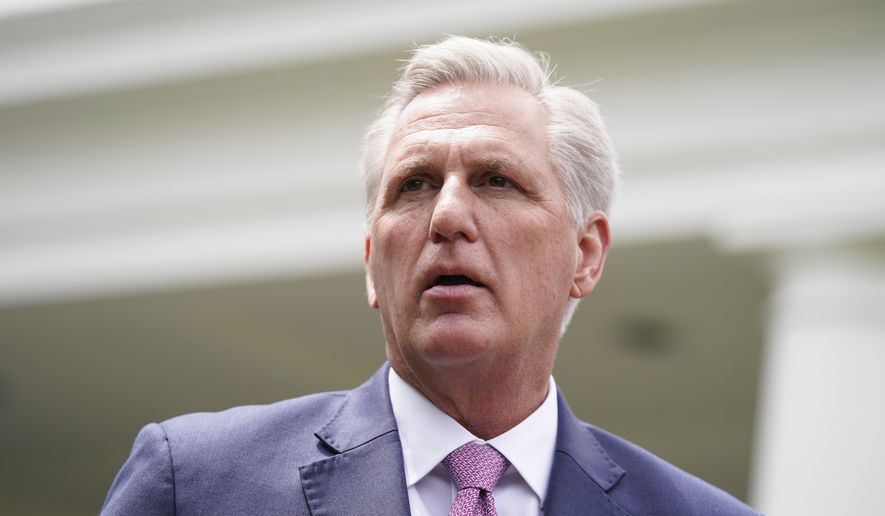The top House Republican said Tuesday he won’t support the creation of a commission to investigate the pro-Trump mob’s attack on the Capitol in January, blaming Democrats for dithering and politicking and saying he didn’t want to hurt ongoing criminal cases.
House Minority Leader Kevin McCarthy of California announced his opposition as the House Rules Committee advanced the bill that would create the commission as well as a $1.9 billion emergency spending bill that would pay for enhancing security on Capitol Hill.
Mr. McCarthy’s opposition undercuts some in his own party, including Rep. John Katko, the top Republican on the Homeland Security Committee who had struck an agreement on the commission. He won concessions from Democrats, including making the panel evenly bipartisan.
But Mr. McCarthy offered a plethora of reasons Tuesday for why that isn’t enough.
He said other investigations are ongoing, money has already been allocated for reviews of Capitol security, and the Justice Department has made 445 arrests and is prosecuting those cases.
“Unfortunately, the legislation being considered in the House this week is drafted in such a way that could interfere with and ultimately undermine these ongoing prosecutorial efforts — just one byproduct of a process that circumvents committee markup and is expected to come to the House Floor under a closed rule,” he said.
SEE ALSO: Bills aimed at fixing Capitol security after Jan. 6 attack advance in the House
He also complained that Democrats have not done enough about the violence that scorched cities last summer.
Analysts, though, say Mr. McCarthy is worried about angering the hefty Trump faction within his GOP troops.
Both security measures passed on 9-4 party-line votes, with all four Republicans on the panel opposing them. The measures now head to a full House vote as early as Wednesday.
GOP opposition to the bills could create big obstacles for the Democrats, who narrowly control both chambers. If Democrats can’t muster enough support among Republicans, the security bill likely would have to be renegotiated in the Senate before it could be sent to President Biden’s desk for approval.
House Republicans criticized several portions of the $1.9 billion spending package. They objected to the creation of a quick reaction force that would be under the control of the D.C. National Guard instead of Congress and some of the security costs.
They also blasted Democrats for moving forward without Republican support and an agreement on the cost of security needs.
“It is truly unfortunate that in a matter of this gravity the Democrats were not interested in an agreement,” said Rep. Tom Cole of Oklahoma, the top Republican on the House Rules Committee.
Democrats, however, insisted that the Republican proposal of a $2.4 billion bill that would have allocated half its funds to the Department of Defense’s COVID-19 response efforts was not made in good faith.
Rep. Rosa DeLauro, Connecticut Democrat, said the GOP plan “was not a serious proposal in terms of looking at what we need to move forward on, in terms of security at the Capitol.”
The measure to create a bipartisan commission also was received with criticism, with Republicans — following Mr. McCarthy’s lead — demanding that the panel’s scope be expanded to other instances of violence.
Mr. Cole requested that the commission look more broadly at other political violence, including last summer’s social justice protests and the 2017 shooting of Republican lawmakers during a practice for the congressional baseball game.
Rep. Jim McGovern, Massachusetts Democrat and committee chairman, insisted that the commission wouldn’t “engage in a partisan fishing expedition.”
The bill would establish a 10-member bipartisan commission to investigate the causes of the attack and the security failures that may have caused the information to be missed. It would be modeled after the investigative panel that reviewed the causes of the Sept. 11, 2011, terrorist attacks.
• Stephen Dinan can be reached at sdinan@washingtontimes.com.
• Jeff Mordock can be reached at jmordock@washingtontimes.com.




Please read our comment policy before commenting.